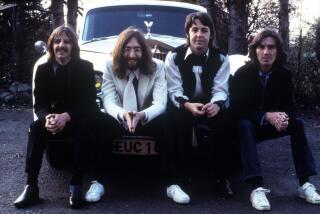Beatles’ ‘Fan’ Gets Ticket to Produce : Pop music: Jeff Lynne jumped at the chance when George Harrison, a fellow Traveling Wilbury, asked if he wanted to produce the Fab Four’s first new recordings since 1970.
- Share via
Meet the Beatles’ producer, Otis Wilbury--also known as Jeff Lynne, who produced “Free as a Bird” and “Real Love,” the first Beatles recordings since the group broke up in 1970.
“One day, George [Harrison] said to me, ‘You fancy doing it, then--the Beatles one?’ And I said, ‘Uhhhhh, yes, please,’ ” says Lynne, 47, a band mate of Harrison’s in the star-studded Traveling Wilburys. “As soon as I realized I was going to be working with them, I was like ‘Whoopee!’ I’d get up each morning with a mixture of elation and dread.”
Dread?
“I was also very scared,” says the Los Angeles-based Englishman. “They’re the Beatles. . . . “
Spoken like a fan--or, as Lynne puts it, the Beatles’ “biggest fan ever, I think.”
Lynne is also the founder of the Electric Light Orchestra, a group that deftly emulated Beatles arrangements and harmonies in the ‘70s and ‘80s with such hits as “Turn to Stone” and “Evil Woman.” He produced Harrison’s 1987 “Cloud Nine” album and co-produced the two Wilburys projects with Harrison.
The Beatles’ original producer, George Martin, opted not to guide the reunion sessions, Lynne says, because he was busy compiling the three double-CD volumes of the upcoming Beatles “Anthology” series. (Martin has said that he bowed out principally due to his diminished hearing.) A new song will appear on each of the first two volumes of the series, with plans for the third still up in the air.
Harrison, Paul McCartney and Ringo Starr first reconvened in February, 1994, for a nearly three-week session at McCartney’s studio on his Sussex estate.
They had crude, homemade tapes of four unfinished John Lennon songs furnished by Yoko Ono--”Free as a Bird,” written in 1977 for the unrealized musical “The Ballad of John and Yoko”; “Real Love” (a different version from the one on the “Imagine: John Lennon” soundtrack); “Grow Old With Me” (released as a demo on John and Yoko’s “Milk and Honey” album), and a minor-key piano ballad that Lynne speculates will be titled either “Now and Then” or “Miss You.”
“We lived with the tapes for a bit, just listening to them,” Lynne says. “They were very noisy and required a lot of work. We then added backing, starting with acoustic guitars and drums. Paul played bass and George lead guitar. It sounded like--the Beatles!”
The first track was “Bird,” which will be unveiled Sunday at the end of ABC’s first episode of “The Beatles Anthology” and will be included in “Vol. 1” of the CD series, in stores Tuesday. McCartney and Harrison, Lynne says, collaborated to write the unfinished bridge of the song: “How did we lose the touch?/It always meant so much/Do we really live without each other?”
Lynne--who sat smack between McCartney and Harrison as they worked--reported that the sometimes estranged old friends “got on tremendously well.”
“Now and Then” or “Miss You,” the instrumental, was attempted at the second session at the same studio in February of this year, then abandoned.
“There was one afternoon messing with it, but a lot of words weren’t there. We did a rough backing track. It was a very sweet song and I wish we could have finished it. The decision was made to do something already complete. Also because of the [limited] time frame.”
Lynne is hopeful that it might yet happen--as is the brass at Capitol/EMI, which would like the track for next April’s “Vol. 3” release in order to feature one reunion track in each of the three “Anthology” sets. The group instead turned to “Real Love,” which will be released around Valentine’s Day. (“Grow Old With Me” was never worked on in the studio.)
“It’s a much simpler song than ‘Free as a Bird,’ ” Lynne says. “I wouldn’t say one is better than the other, although ‘Free as a Bird’ is probably deeper and more meaningful.”
There was “a little talk” among the three Beatles about possibly doing a whole album, Lynne says, but “time just didn’t permit it.”
Among the studio tricks he employed in the “Bird” sessions were cutting up Lennon’s slightly out-of-time vocal to get it in proper rhythm, and matching McCartney’s studio piano with Lennon’s piano sound--”sort of like a jigsaw puzzle, really, the way we got it to work.”
Lynne had never worked with McCartney before. Was there any friction? “It probably took a day to break the ice,” he says. “Since then, we’ve become great friends. We’ve sort of discussed [working together], but nothing definite.”
The producer disputes the rumors that Harrison was the most reluctant participant. The reunion recordings, he suggests, were not so much a comeback as they were a long-deferred ending to the Beatles’ glorious but often tragic story.
“They all wanted to do it, really,” he says. “I think they wanted to finish on an up note . . . as opposed to the other ending. And do some nice music together, and have fun again. Put the past behind them. And that’s how it worked out. We had some great laughs.”
More to Read
The biggest entertainment stories
Get our big stories about Hollywood, film, television, music, arts, culture and more right in your inbox as soon as they publish.
You may occasionally receive promotional content from the Los Angeles Times.










